UN General Assembly
President Francis
WE NEED TO GET SERIOUS ABOUT SUSTAINABILITY

WE NEED TO GET SERIOUS ABOUT SUSTAINABILITY
IN THE CARIBBEAN
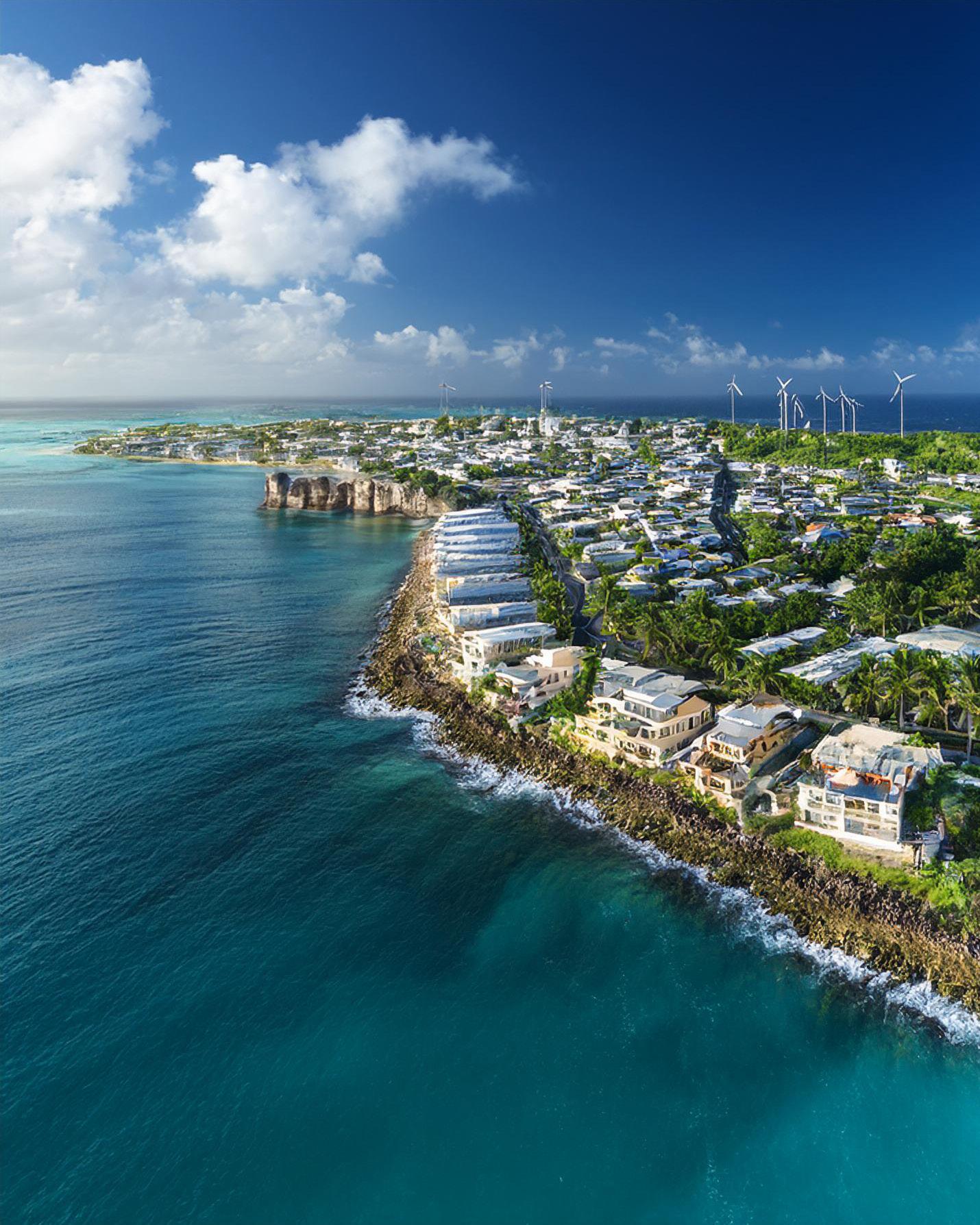
A Look at ECLAC’s work ON JUST TRANSITION
Issued on a monthly basis, The Hummingbird offers insights into the latest projects, publications, technical assistance missions and research carried out by ECLAC Caribbean. In addition to these, sneak previews are provided of the most salient upcoming events, alongside enriching followups to previously covered issues. With a view to featuring a variety of facets of Caribbean life and lifestyle, The Hummingbird also zooms in on cultural activities and landmark occurrences through an eye-opening regional round-up.
Editor: Jabari Fraser
Writer: Rachael Amanda Espinet Design and Layout: Liseanne Martin-Subero
Please see our contact details on the back cover of this magazine.
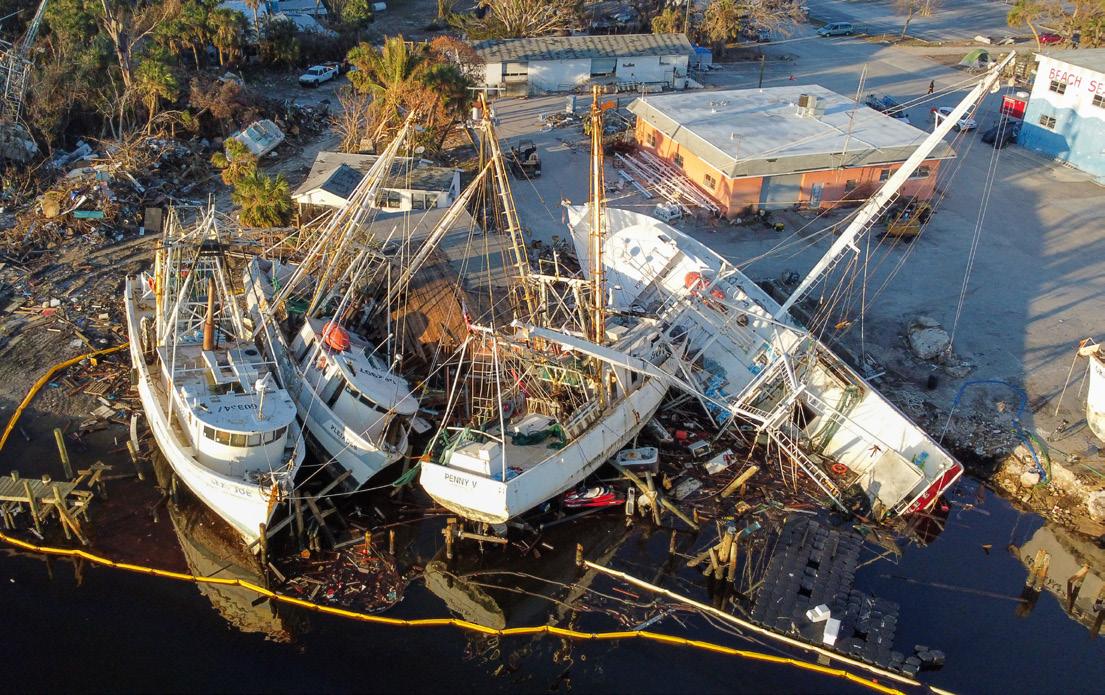



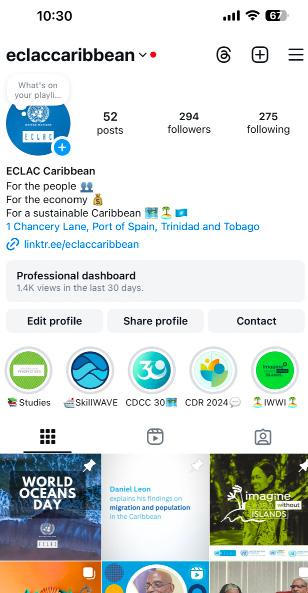
The 78th President of the United Nations General Assembly, Dennis Francis is back in his homeland of Trinidad and Tobago as his term comes to an end… and he’s expressing concern that if the world doesn’t get serious about sustainable development, that lifestyles on his islands, and others around the world could become disturbingly different.
“The question of recycling plastics is big, as well, on the agenda, if you know what is happening to our oceans with plastics. If we do nothing or if we continue on the present trajectory, by 2050, there will be more plastic in the sea than fish. So, consider going to the market and buying a five pound plastic rather than buying a five pound King Fish (The Scomberomorus cavalla – King Mackerel, also known as Surmayi is a popular and premium delicacy in Trinidad and Tobago, and other Caribbean islands).
Ambassador Francis has had a career in diplomacy representing his native Trinidad and Tobago for some 40 years. He assumed the position of President of the General Assembly in September 2023, and is due to demit office in September 2024. The United Nations General Assembly (the main policy-making body of the UN, where all 193 members are represented) elects a president annually, to chair and preside over the Assembly. His Excellency Dennis Francis, continues in term as President of the General Assembly until September 2024, when the current session of the General Assembly ends.
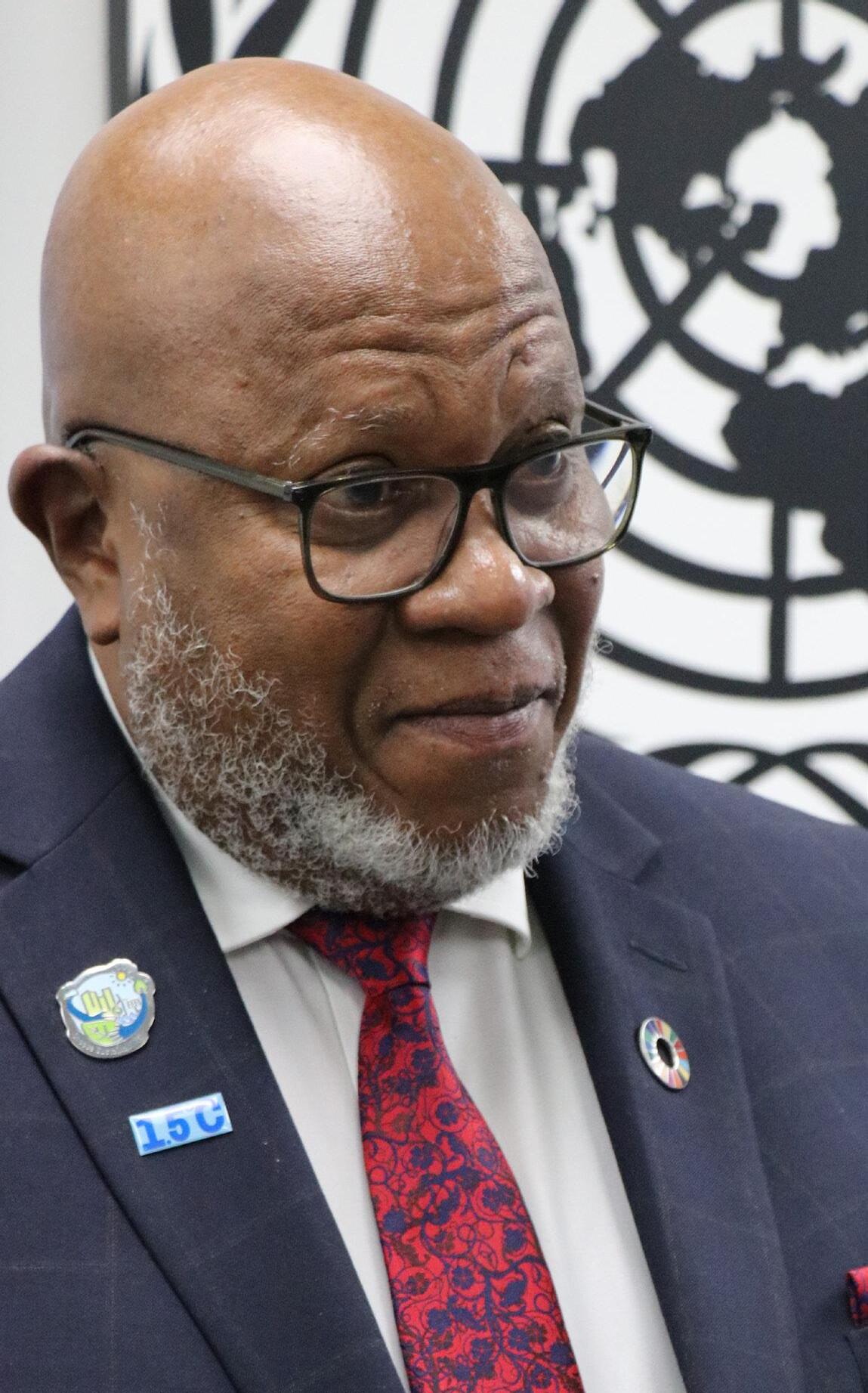
General Assembly President Francis met with a cross section of UN staff in Trinidad and Tobago and reminded them that their mission is vital to the impact of the United Nations, “…as much as we who sit in the house in New York tend to believe that we are at the seat of the UN, the more astute among us know, very well, that the UN’s existence really is in the field. Close to the people that the UN is intended to serve.”
As he has been known to do over the year of his service to the General Assembly, and the people of the world, President Francis touched on a range of issues, from the war in Gaza, to the lack of progress on achieving the Sustainable Development Goals (SDGs), energy, the climate crisis
and Small Island Developing States (SIDS).
On the rush to achieve the 17 Sustainable Development Goals by 2030, a task on which the countries of the world are desperately behind, he said: “My own take on this, is that the UN had given a commitment in 2015. The United Nations has an obligation. It's a matter of honour to complete the commitment that you gave. So, we are working on that and using the Summit of the Future to get Heads of State and Government to recommit to completing the SDGs and not just recommit by rhetoric, but recommit, in terms of action, deliberate state action… 980 million people suffering from a hunger and poverty in 2024 is not acceptable. It
just is not acceptable when we have the means and the opportunity to do something about it. Particularly when you consider that one, man, a single man can buy one company for 41 billion dollars.”
This year, the world crossed the critical milestone of the midpoint in the implementation of the 2030 Agenda for Sustainable Development. To mark the occasion and to reinvigorate the push for sustainability, President Francis championed a UN General Assembly Sustainability Week. He cites it as one of the high points in his tenure. It included high-level discussions on Tourism, Transportation and Global Stocktaking on Energy.

Pointing to the blue 1.5°C pin fastened to his jacket’s lapel, he stressed the importance of the temperature increase limit for small islands.
“I wear this every day, it’s a very important message, because there is a lot of pushback on this 1.5. There are people who are talking 2 and 2.5. That will devastate the Caribbean, and the Pacific and the Indian ocean SIDS.”
“One point five to stay alive!” is a slogan coined and used widely in islands, activist, youth, climate and diplomacy circles to stress the importance and existential danger of limiting global warming to no more than 1.5 degrees. February 2023 - January 2024 was the first 12-month period to exceed the average 1.5°C increase.
Speaking seriously to the UN staff keen on his word, he continued, “So politically, this is a crucial and very important message. Otherwise, we’ll all have to develop gills and fins in 20 or 30 years. So, you have to wear it!”
Passionate about sustainable development, especially for SIDS, he said the global concern of energy, and tapering the usage of fossil fuels towards net zero is moving in the opposite direction as coal plants have begun to reappear in Europe. He is concerned that some developed country governments have been reversing their commitments to climate action, “… it certainly imperils, those of us who are already highly vulnerable to climate change like Small Island Developing States and low-lying areas. Infrastructure... you can't
develop an economy without having an enabling infrastructure. Transportation, same thing. And of course, global debt. Which is a drag, as you know from your work in the regional commission. It's a real drug on development.”
Director of ECLAC Caribbean
Diane Quarless and UN Resident Coordinator ad interim chaired the meeting with United Nations staff from Trinidad and Tobago and other parts of the Caribbean. She said President Francis has shown his superior calibre as a diplomat for many decades, as a highly skilled and deft negotiator. She said in the last year, his dynamic and purposeful presidency of the General Assembly has made every Caribbean citizen proud. She pointed out two standout highlights of his tenure.
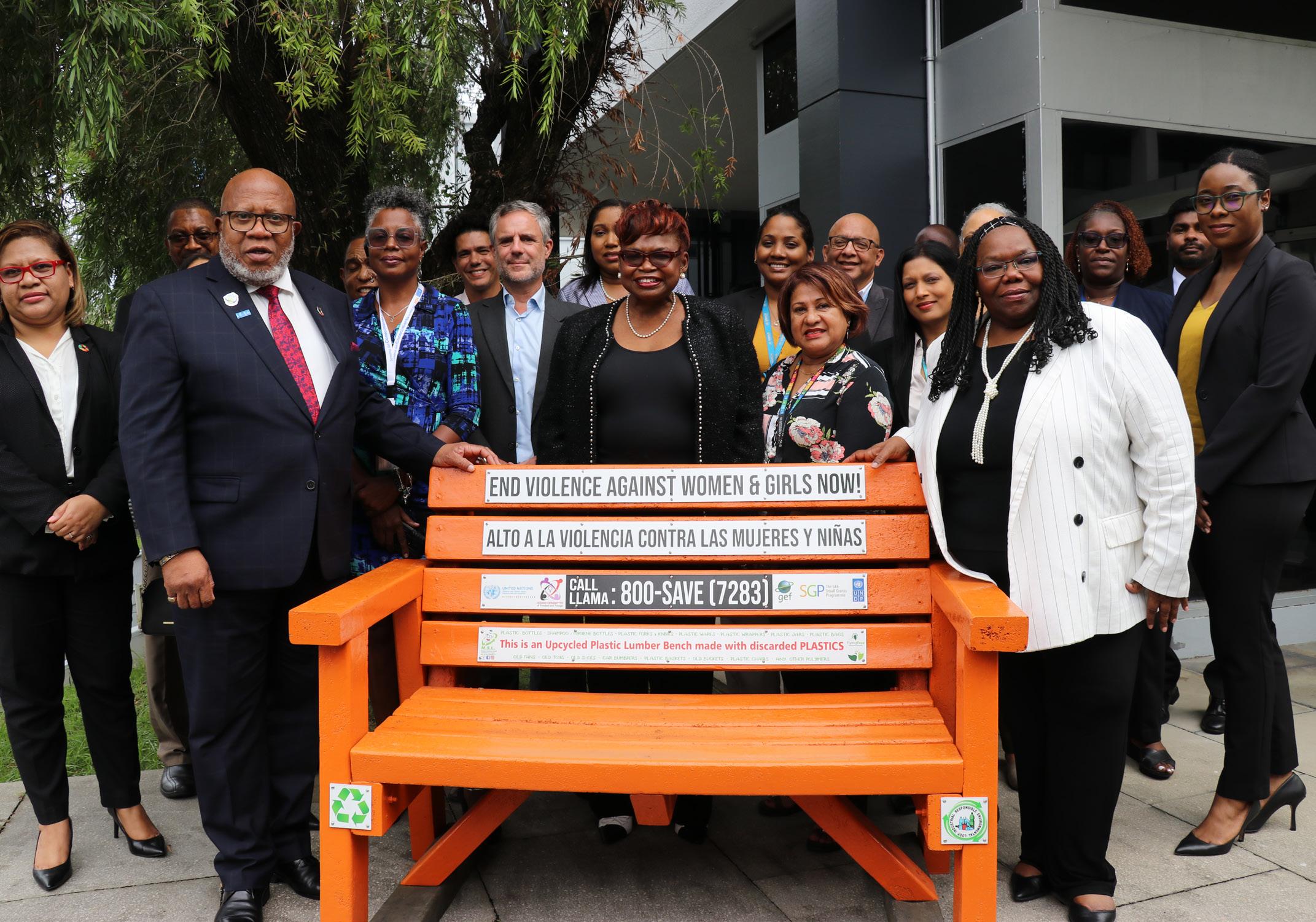
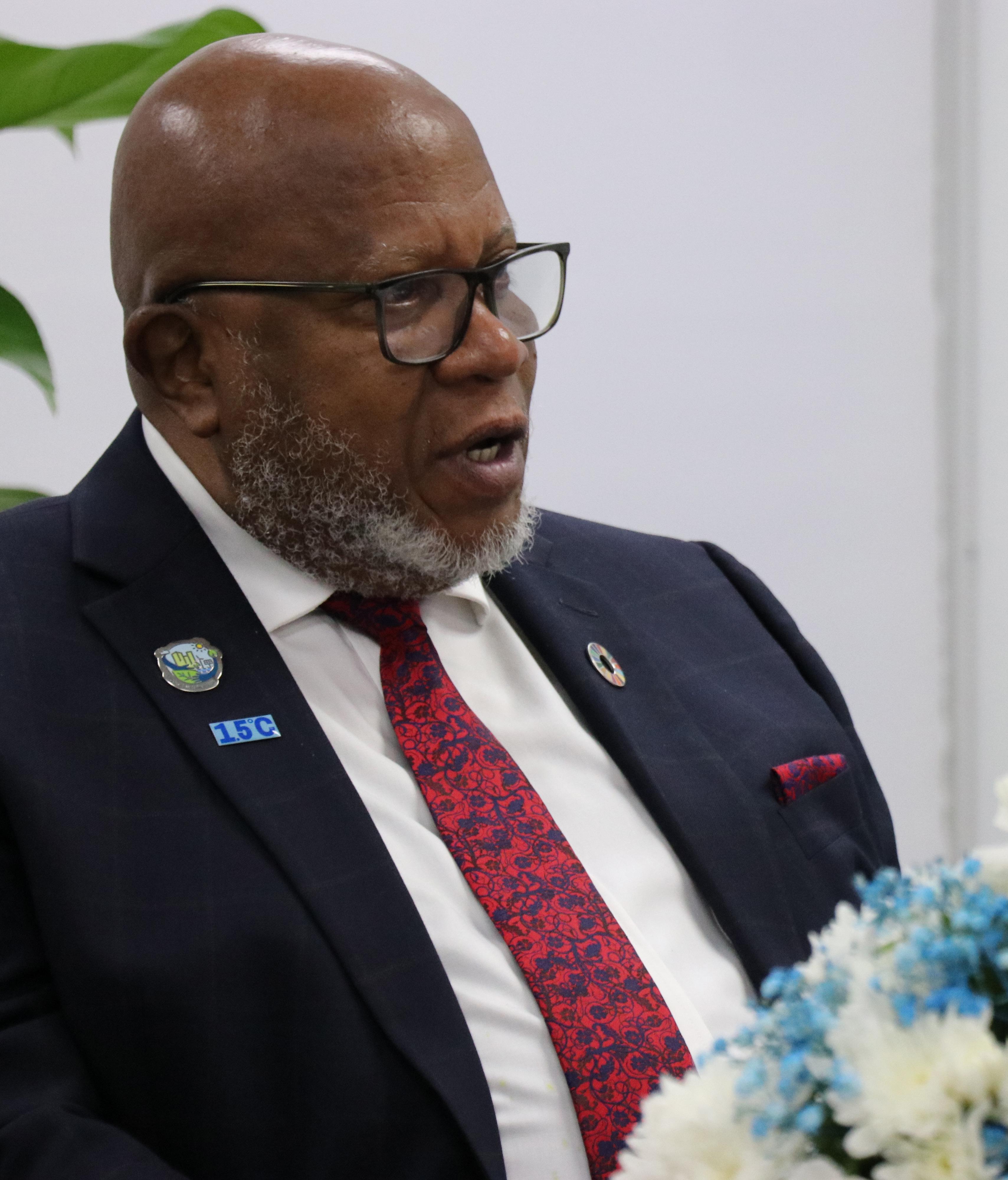
“I remember, Ambassador, being rivetted by your words at the opening of Special Session on the Escalation of the Violence in Gaza, when you spoke sternly of violence breeding violence, despair, destruction and the dehumanization of people. Of disillusionment of those who look to the UN as the guarantor of good. Of each life lost a stain on our moral conscience. It was your efforts to seek resolution in intractable circumstances such as that in Gaza, that attracted the attention of the Vatican and secured an invitation, most recently, for you to dialogue with Pope Francis.” He notes that his position on Gaza has been a tenet of his presidency.
“It is fundamentally your love of home and of all things Caribbean that inspired your initiative to have the Steelpan, the only instrument created in the twentieth century, recognized and enshrined in the house of the United Nations. As you enter the final month of your tenure as President of the General Assembly, 78th session, it is our distinct privilege to have this opportunity to engage with you directly and to hail you as a distinguished son of the Caribbean. We are proud to be giving service to your country even as you have given unstinting service to the world.”


Can you visualize a Caribbean road scene without the overloaded buses and maxi taxis carrying people and goods from coasts to island interiors, without some black smoke puffing into the air? How will a transition to renewable energy affect development, lives and jobs in countries like Trinidad and Tobago and Guyana, with mineral and fossil fuel economies, new and old? Imagine a trip to a typical Caribbean beach scene, without the scent of fishermen’s diesel wafting to your nose as they bring in a fresh catch. There are many mixed implications of our region moving from fossil fuel usage to using renewable, more environmentally friendly fuel.


continued from page 7
As the global climate crisis intensifies and small islands look to secure their continued existence, the world is seeking to move away from planet-warming fossil fuels. This, however, has follow-on effects for countries that have energy-based economies and for millions of lives and livelihoods around the world. Therefore, countries around the United Nations table have agreed to pursue a “just transition” to lowcarbon economies. A just transition is one in which there is energy transition; but marginalized groups are not further set back, jobs are not lost, economies do not falter, workers and communities are engaged in the decisions that affect them.

HEAD OF MULTILATERAL ENVIRONMENTAL AGREEMENTS,
MINISTRY OF PLANNING AND DEVELOPMENT, TRINIDAD AND TOBAGO
Caribbean development and environmental specialists shared their vision for just transition in the region at an event called Caribbean Climate Talks: Just Transition in the Caribbean – put on by Climate Analytics Caribbean and the German Embassy in Port-of-Spain, Trinidad and Tobago. Panelists included ECLAC Caribbean Director Diane Quarless, Trinidad and Tobago’s Head of Multilateral Environmental Agreements Kishan Kumarsingh, and Director of Climate Analytics Caribbean Rueanna Haynes.
…Just transition cannot be seen as an energy sector issue, nor as an industrial sector issue, but as a whole economy based issue, as low carbon development, is meant to address emissions across all sectors of the economy. As a result, just transition cannot be a sector specific issue in considering strategies to sustainably attain this goal, Trinidad and Tobago faces, the dual challenge of transitioning towards low carbon development, including through an energy transition, while safeguarding the livelihoods of those reliant on traditional industries, particularly in a nation where the energy sector has long been the cornerstone of the economy.
The government of Trinidad and Tobago, through the Ministry of Planning and Development has developed a just transition policy, which outlines the measures to facilitate a smooth and inclusive shift towards a low carbon economy, while diversifying and generating opportunities for the workforce… This policy was guided by principles outlined in the Paris Agreement… A consultation process… The policy was developed with the aim of synergizing the development approach across sectors so as to catalyse our holistic approach to sustainable development, integrating principles of social equity, economic diversification and environmental stewardship. The principles guiding the policy are grouped according to four dimensions. Participation and governance, climate, social and economic, ensuring that the policy provides substantial economic growth opportunities with social benefits… To this end, principled approaches related to retooling, reskilling, reschooling upskilling and redeployment or skill transferability are undertaken. Our next area of Endeavour is to assess green job skills in the transition and so inform training and education initiatives, as we also have to prepare the future Workforce for the new economy.

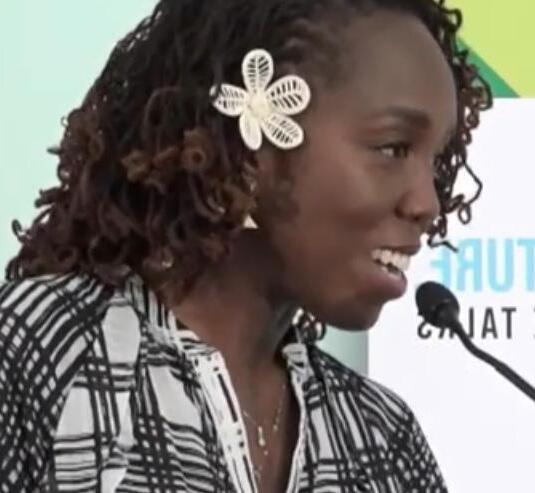
RUEANNA HAYNES
DIRECTOR OF CLIMATE ANALYTICS CARIBBEAN
change priorities. Some proposed priorities for the Caribbean as per the Caribbean, climate justice agenda… First of all, the development of publicprivate partnerships to develop reskilling and upskilling strategies, using bottom up and inclusive approaches, just transition policy development, that is coherent with existing climate trade and sustainable development policies, and goals. Regional coordination and collaboration at all levels and this may actually involve the establishment of some type of fora where this issue can be discussed in a joined up manner, as well as participatory monitoring and evaluation to track progress and further reporting in nationally determined contributions and other national communications in support of just transition outcomes.
Transitioning from fossil fuels as you’ve heard from Kishan, and creating a disaster resilient infrastructure and activities entails high up. front costs with long, payback periods, and this mismatch can only be met with a harnessing of suitable financing. Low-cost, long-term, accessible financing for countries that are upper middle, high income countries, not easily accessing concessional financing and yet, we need that kind of financing for investment for long-term investment in adaptation in order to achieve just transition. Of course, finances are only one dimension of the imperative for catalyzing, just transitioning in the Caribbean. Countries in the Caribbean also need to undergo a period of structural change. This is diversification to develop new green industries.
This will require fear and accessible mechanisms for transferring affordable technology from developed countries, capacity building in installation in repair and maintenance of green electricity plants and other systems. Investment in training and upgrading of skills of the region's workforce. Moreover, Caribbean countries will need to shift from their current focus on individual projects, and climate aid to a more comprehensive and integrated approach that explores and pursues synergies in sourcing finance and technology on a sub-regional basis. We can't be working in silos. We have got to find ways to work together because the investment, the cost of this transition is expensive and our islands are small. We need to maximize and ensure that there are economies of scale by investing in sub-regional projects among all the countries of the region. It is important to bear in mind that disaster risk reduction and resilience building are also vital aspects of the just transition in the Caribbean.

DIRECTOR, ECLAC CARIBBEAN
The OPCC is a network of Latin American and Caribbean parliamentarians and government technical officers. It aims to bolster the region’s environmental and climate legislation and promote collaboration on just transition.
At the Fourth International Conference on Small Island Developing States in Antigua earlier this year, ECLAC launched the OPCC in the Caribbean with the help of regional leaders, parliamentarians, and climate experts. British Virgin Islands Premier Natalio Wheatley reminded Caribbean parliamentarians of the power they have to make a difference in climate action and just transition and the impact of meaningful collaboration.
“Legislation is one of the most powerful tools that we have in our arsenal to
combat climate change and socially engineer the future we envisage for ourselves.” He says for a long time, Caribbean countries such as the BVI have been siloed in their efforts to craft legislative solutions to effectively respond to their evolving and complex challenges, including in the areas of environment and climate change.
The launch, which took place in the margins of the SIDS4 Conference, also featured contributions from Dominican Republic’s Vice Minister of Climate Change and Sustainability

Milagros De Camps. She says the OPCC provides the type of collaborative support across the region, where countries have similar experiences. “This experience, has been able to enhance the comprehensiveness, effectiveness and relevance of its legal framework to address climate challenges. The exchange of information, ideas, form the policy makers of the different countries in the Latin America and Caribbean region has enabled us to identify the different gaps, address concerns and incorporate innovative approaches into the framework.”
Member of Curacao’s parliament Gwendell Mercelina also presented at the launch and spoke about the important role that parliamentarians have in determining the coming years and decades of life for SIDS and island people. “As servants of the people… you’re a designer of the future, you have to talk about climate change. You have to talk about just transition. We’re not only talking about energy, climate change, just transition has to be equal

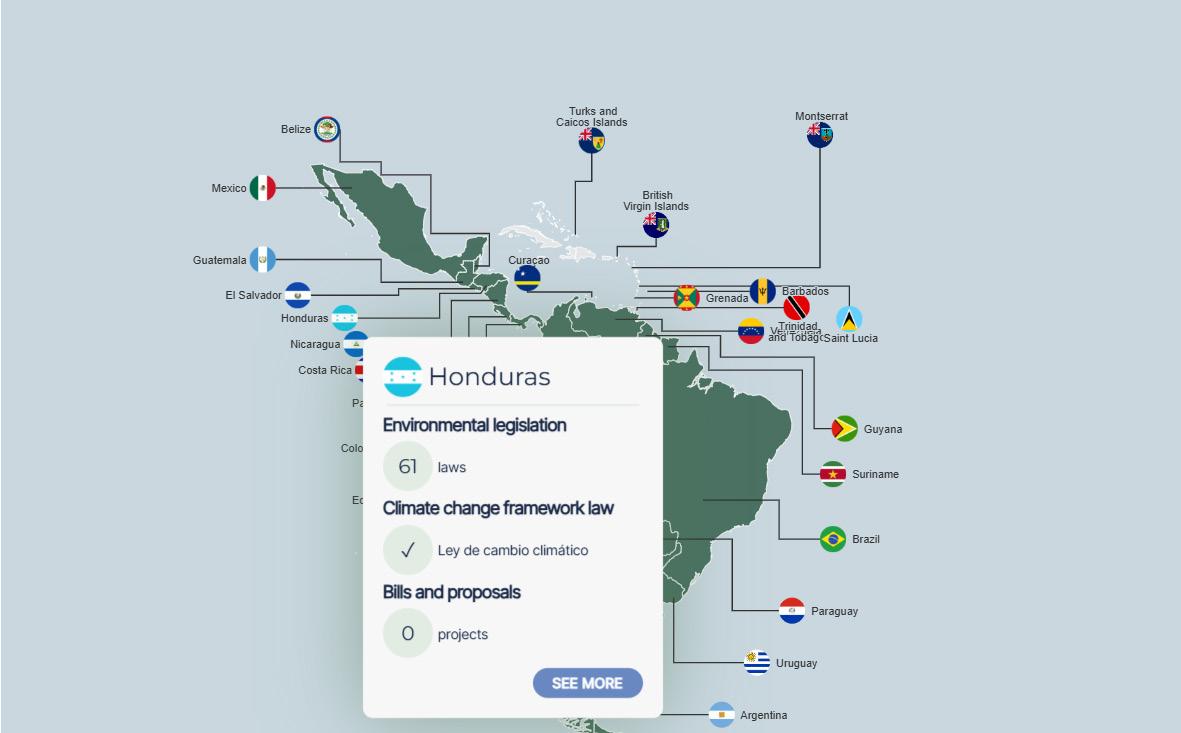
The OPCC data platform is a transparent and for free instrument that provides a new way of seeing the legislative activity of countries in LAC, presenting indicators through a strong visual approach, with interactive graphs, action panels and comparable data in dashboard format. The platform is innovative not only for identifying and classifying data on environmental laws and decrees (current or repealed), but also for collecting data on environmental bills in progress in recent years in various LAC countries. The data is constantly updated to offer complete and reliable information to the user. For this reason, the free and
creative use of available resources and tools is encouraged, which were designed to enable and facilitate broad and in-depth analysis of legislative activities in climate and just transition in LAC. In this sense, the expectation is that the OPCC data platform is a useful tool that highlights progress, opportunities for collaboration, and ways to advance on these issues in the region.

For the most part, when just transition is on the agenda, it is considered from a developed country’s perspective, as it is these industrialized countries which are the principal emitters of greenhouse gases. Unfortunately, not enough attention is given to the most affected populations. SIDS need support to achieve just transition, even while they require assistance with climate adaptation as they are the most significantly affected by climate change despite being the least significant emitters of greenhouse gases.
Caribbean countries with fossil fuel energy resources further have the challenge of fulfilling time sensitive renewable energy commitments, which implies curtailing the use of their natural resource for their benefit, developing their industries to fullest potential, as the industrialized nations had the chance to do.
High Upfront Costs of renewable energy infrastructure
Exposure to environmental hazards and extreme weather events
Limited land availability
Limited Access to Finance
Dependence on Fossil Fuel imports, making green energy less competitive
Economies of Scale
Limited technical expertise
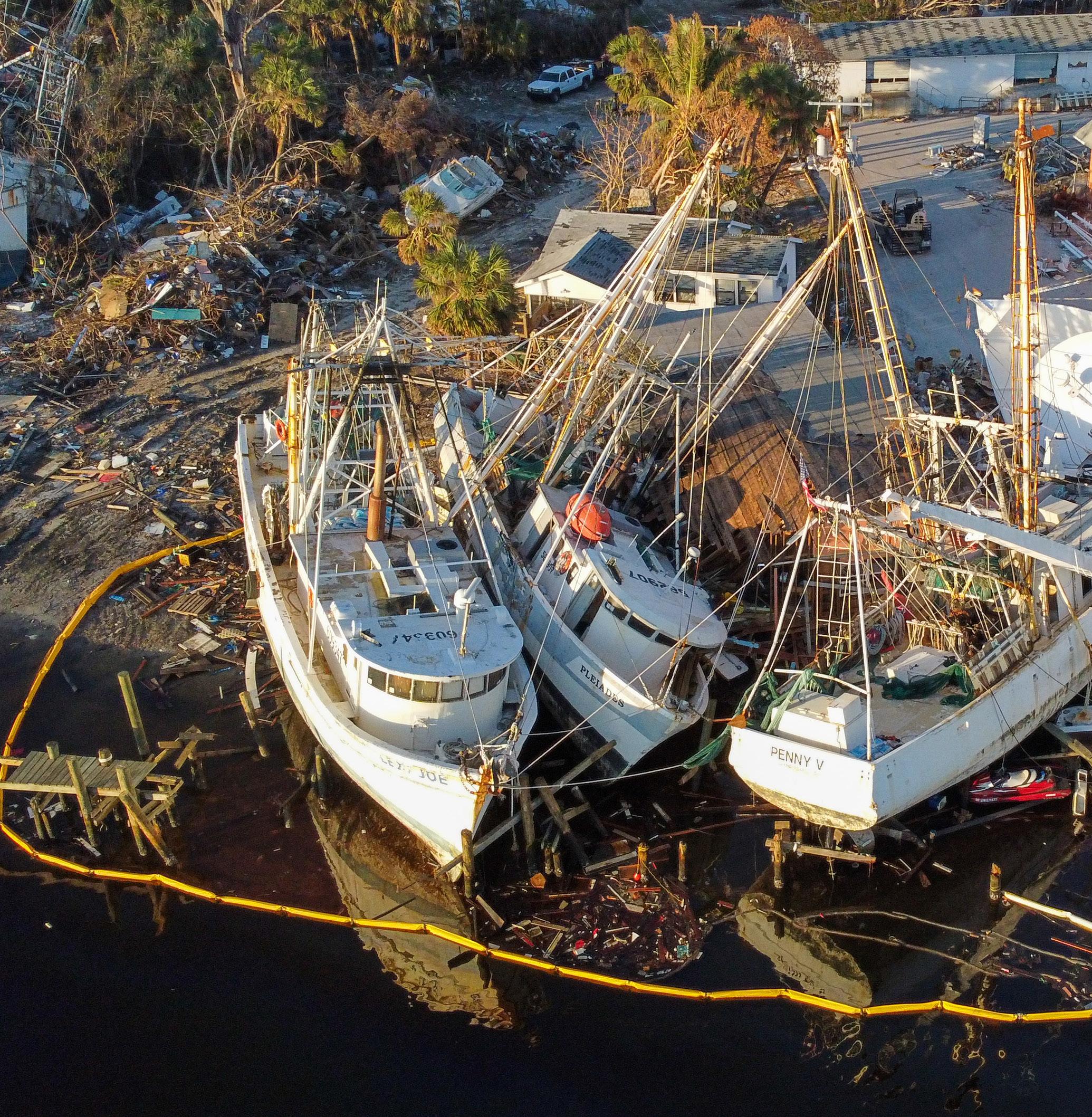
Great solar potential – solar energy is a highly viable resource
Ocean and Tidal energy – The Caribbean’s large marine area provides opportunities for marine energy development
Wind Energy – Caribbean coastlines have significant wind energy potential
Geothermal Resources – Islands such as Dominica, Saint Kitts and Nevis and Saint Lucia have geothermal energy due to volcanic activity
Strength of CARICOM, OECS and regional cooperation frameworks have potential to make just transition a collaborative project


Ministers and policy makers from twenty-three countries across the Caribbean will gather in Trinidad and Tobago next week to discuss and forge a path for transforming and building inclusive and sustainable Caribbean development at the United Nations Economic Commission for Latin America and the Caribbean’s meetings of the Caribbean Development Roundtable and Caribbean Development and Cooperation Committee.
The deliberations come on the heels of the Fourth International Conference on Small Island Developing States, held in Antigua and Barbuda in May. Out of that meeting emerged the Antigua and Barbuda Agenda for SIDS (ABAS), a 10-year multilateral commitment to support SIDS in achieving sustainable development and resilient prosperity. Discussions at this ECLAC Caribbean’s meetings will focus on ensuring resilient growth and sustainable development of the region, informed by the ABAS.
ECLAC Caribbean Director Diane Quarless says this about the Caribbean’s development focus: “The CDCC is such a great mechanism for development and cooperation in the Caribbean. The CDCC has been in existence for 49 years but meets biennially, and this is its 30th meeting. It is truly an inclusive forum embracing all states and territories in the subregion, and it fosters and facilitates regular collaboration and consultation with the agencies of the wider UN system as well as regional and international organizations for exchange of ideas and a collective effort to address economic, social and environmental challenges, working to build technical and institutional capacity

in the individual countries, making the development project work. How to advance the sustainable development agenda. How we ensure that our multidimensional vulnerability does not undermine our capacity to achieve the Sustainable Development Goals by 2030.”
This year, the CDR will feature discussions on the five important areas of: climate change and resilience building; operationalizing the Multidimensional Vulnerability Index (MVI); improving access to climate finance; improving productive development policy and revisiting economic diversification for development. These topics of discussion are integral to the pursuit of sustainable development and critical in addressing the multiple challenges and crises that small island developing States face. ECLAC Executive Secretary Salazar Xirinachs will present the Commission’s rethinking of strategies to transform the region’s development model to make it more productive, inclusive and sustainable.
Established in 1975, the CDCC is the intergovernmental subsidiary organ of ECLAC that meets at ministerial level the Caribbean, who promote and strengthen economic and social cooperation and integration among the countries of Latin America and the Caribbean.
The Caribbean Development Roundtable (CDR) is the premier forum for development discussion in the Caribbean. It is where policymakers meet thinkers and people. It is the engine room for development thinking and cooperative action in the Caribbean.
Trinidad and Tobago, and the world celebrated the second World Steelpan Day on August 11. Declared an international day by the UN General Assembly in 2023, it is a time to honour and celebrate the only acoustic, non-electric, orchestral instrument developed in the 20th century. The steelpan is a symbol of colonial resistance and Caribbean resilience. Created out of necessity, the steelpan symbolizes creativity and musical expression as a response to adversity. The steelpan makes a meaningful contribution to the Caribbean’s creative economy.
• The steelpan is the national instrument of Trinidad and Tobago. Laventille, Trinidad, is considered its birthplace.
•

• The steelpan was born from resistance to colonial bans on African drums during Carnival. Early steelbands were considered gangs. Players were labelled as “Badjohns” and bands assumed names like Desperadoes, Renegades and Invaders.
•
• Before the steelpan, there was the tamboo bamboo, a percussion instrument made from bamboo. In 1934, Tamboo Bamboo was banned due to its use in gang violence.
•
• Early steelpans were made from discarded oil drums, car parts, paint pots, and biscuit tins. The early inventors found that raising sections of oil drums produced distinct tones, which were fine-tuned for melodies.
•
• Pannists such as Winston "Spree" Simon, Ellie Mannette, and Anthony Williams helped refine and popularize the steelpan.

• Steelpans debuted publicly during Trinidad’s Carnival in 1945, after World War II.
•
• The first Panorama competition was held in 1963, won by North Stars Steelband with the song “Dan is the Man.”
•
• In 1951, the Trinidad All-Steel Percussion Orchestra (TASPO) became the first steelband to perform outside of Trinidad, at the Festival of Britain.
•
• The UK’s first school steelband was started in 1969 at Islington Green School. In 1975 the steelpan was added to the music school curriculum in the UK. By 1990, over 150 schools in the UK integrated steelpan studies into their curriculum.
The British Association of
Steelbands was established in 1995 to promote steelpan culture in the UK.
•
• The steelpan played a key role in expanding Trinidad Carnival into a globally recognized festival. The steelpan contributes to cultural tourism and the creative economy, advancing economic development. Globally, the steelpan is featured in global genres, including jazz, rock and classical music.
Enjoy this rendition of Stay Giving Praises by Black Stalin and Ella Andall by leading steelband Phase II Pan Groove, featuring pan virtuoso Len “Boogsie” Sharpe. Emancipation Steelband Street Parade, on the Eastern Main Road in Laventille.

Check out these entertaining and informative shorts on the steelpan produced by the United Nations Information Centre for the Caribbean!
August 12th is International Youth Day, a time to acknowledge the importance of youth engagement in policy making. To help prepare young people in the Caribbean to engage in policy conversations at the United Nations Economic and Social Council Youth Forum (EYF), ECLAC held the Caribbean Youth Dialogues (CYD) which hosted 100 participants from 16 Caribbean countries in April 2024. Young people from Anguilla, Antigua and Barbuda, Bahamas, Barbados, Belize, Cayman Islands, Dominica, Grenada, Guyana, Haiti, Jamaica, Saint Kitts and Nevis, Saint Lucia, Saint Vincent and the Grenadines, Suriname, and Trinidad and Tobago shared their perspectives on actionable ways to approach eradicating poverty in times of multiple crises. The young people addressed many complex challenges the Caribbean has been grappling with, such as the COVID-19 pandemic, climate change, and social instability. The discussions highlighted the pivotal role youth-led initiatives have in helping to increase collaboration among young people, governments, and civil society to address regional challenges.
Economic Affairs Assistant at ECLAC Caribbean, and one of the main
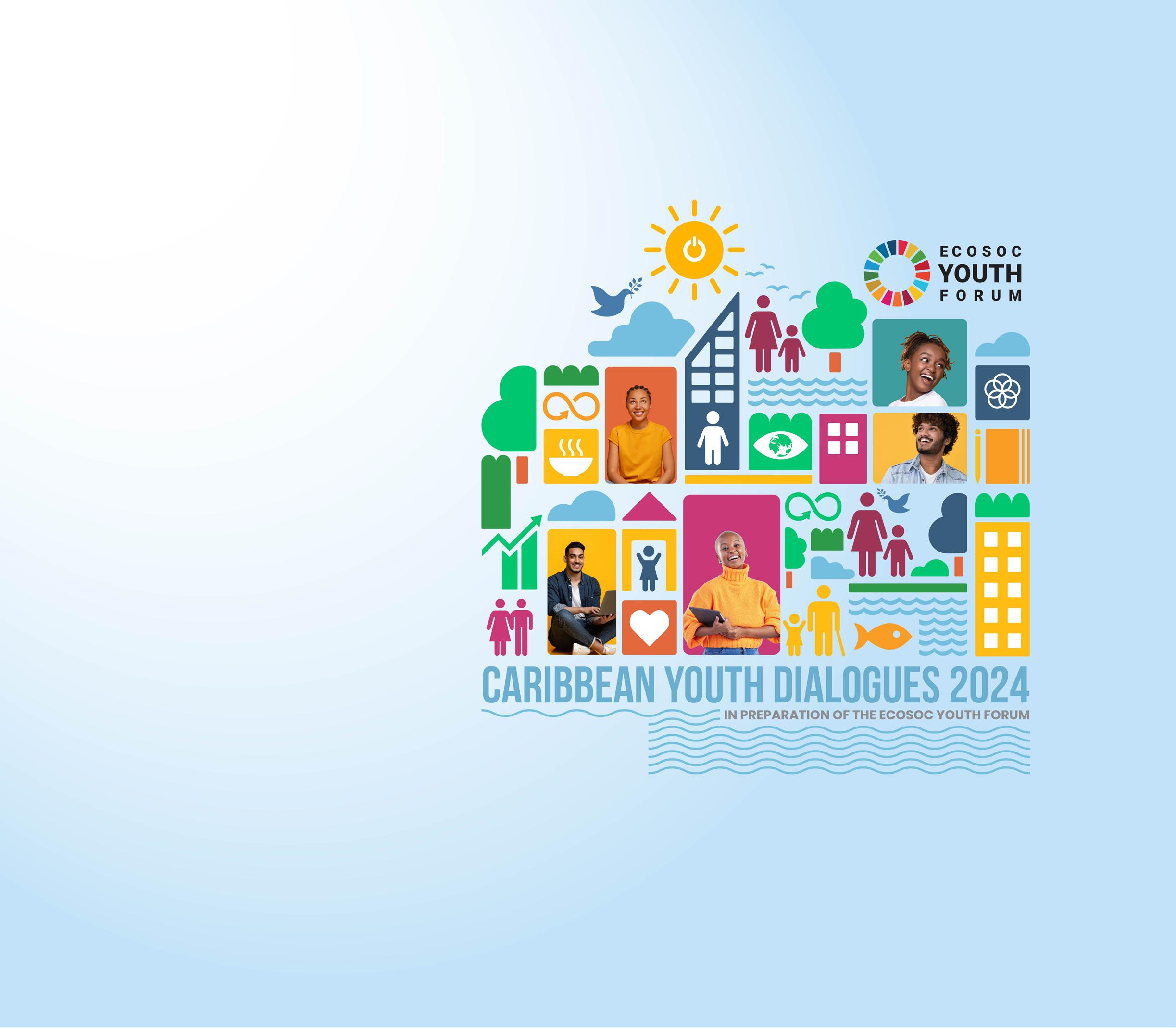




organizers of CYD Candice Gonzales said the Commission recognizes the crucial role of Caribbean youths as “dynamic agents of change,” and it is important to affirm and hear their views on essential issues affecting them. “ECLAC, along with other UN and development partners in the Caribbean, has facilitated the platform where young people can convene to discuss the issues that affect them, propose…We affirm their significant contributions in addressing challenges such as climate change, food security, and economic empowerment through their passion, innovation, and determination”.
Gonzales said their active participation in advocacy, community projects, and entrepreneurship not only propels progress toward the SDGs but also fosters an inclusive and sustainable future for the region. Tehilla Maloney from Caribbean Regional Youth Council (CRYC) in Trinidad and Tobago, said Caribbean youth need more than temporary solutions, but rather strategic and sustainable long-term change to tackle some of the social issues they encounter.
“It is our responsibility to prioritize the well-being and empowerment of our youth, recognizing them as

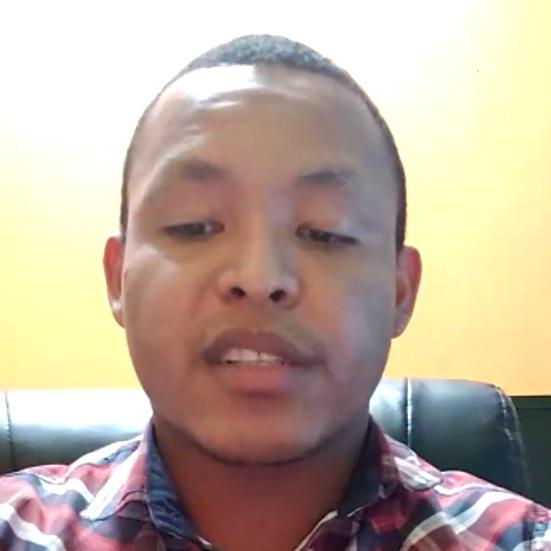
pivotal stakeholders in the region's development trajectory…Let us seize this moment as an opportunity to mobilize collective action, forge meaningful partnerships, and advocate for policies and programs that prioritize the longterm empowerment and long-term wellbeing of Caribbean youth.”
She said together as a region youth can tackle any obstacle put in front of them to realize an inclusive, resilient and prosperous Caribbean.
Haitian civil society leader, Lenz Wendy, founder of HART’s Haiti Inc, a non-profit organization dedicated to using creativity and technology to tackle social issues in education and society, said it would be difficult to achieve the SDGs if young people are not properly educated. “Education is important not only for social and economic stability, but also to ensure that the future youth generation will also have a seat at the table to have a say in their development”.
Barbadian student Pierre Cooke Jr said climate change threatens the food security of small island developing states (SIDS). “While we continue to have conversations about sustainable agricultural practices and farming practices, we must


acknowledge that there is a very real threat that most, if not all of us face, of potentially being impacted by a hurricane or a tropical storm that could threaten our food and nutrition security”. He said making agriculture practices climate resilient by developing production methods and ways of storing foods that can survive natural disasters, can create food security in the region.
Jamaican climate activist, Chevánt Hamilton, the National Coordinator for the Commonwealth Youth Climate Change Network (CYCN) said the average young person does not know what role they can play in effecting change in climate activism. “The climate change conversation is still at a high technical level. Average young people are not adequately sensitized as to why they should even care about climate change and the role they play. This makes engaging them, or their ability to start projects that are aimed at alleviating the impacts of climate change somewhat difficult.” He said climate change is a challenge that requires engagement from the entire society. The public, private, and civil society actors should play a role in safeguarding from climate change by achieving a low carbon, climate resilient society.

Between August 22-23, 1791, enslaved Africans in Saint-Domingue (then a French colony), now Haiti, began their revolt against the system of slavery that oppressed them for generations; a significant act that changed the course of world history. This uprising led to a series of events that eventually contributed to the abolition of the transatlantic slave trade and the independence of Haiti. This rebellion serves as a historical marker of resistance and resilience, highlighting the ongoing impact of slavery on the descendants of those who were enslaved.
For over 400 years, more than 15 million people were forcibly taken from Africa and subjected to the horrors of the transatlantic slave trade. This system left long-lasting scars on the descendants of those enslaved, and its legacy continues to affect people of African descent today. The systemic racism and structural inequalities that emerged from this history remain deeply embedded in many societies.
The International Day for the Remembrance of the Slave Trade and Its Abolition, observed on August 23, commemorates not only the suffering of those who endured slavery but also the ongoing struggle for justice and equality that Black communities face. This day serves as a reminder of the need to address the historical and current injustices that persist as a result of the slave trade.
In 2013, the United Nations proclaimed the period from 2015 to 2024 as the International Decade for People of African Descent under the theme “Recognition, Justice, and Development.” This initiative emphasizes the need to address the continued inequalities faced by people of African descent, who,
despite their contributions to global development, are often marginalized and excluded from full participation in society.
The United Nations notes that one example of this ongoing inequity is the disproportionate maternal mortality rate among Black women. Black women face higher rates of complications during childbirth and are more likely to receive inadequate care. These disparities reflect broader structural inequalities in healthcare and highlight the need for targeted efforts to address racial disparities in maternal health outcomes.
Similarly, Black men face significant racial disparities in law enforcement. From racial profiling to police violence, Black men are disproportionately affected by over-policing and unjust treatment by law enforcement. Despite ongoing calls for police reform, these issues remain entrenched in many societies, and the treatment of Black men by authorities continues to reflect broader patterns of racial discrimination.
As the International Decade for People of African Descent draws to a close in 2024, it is clear that much work remains to address the systemic inequalities that continue to affect people of African descent. Progress will require concrete actions, such as better data collection, stronger legal protections, and targeted policies aimed at eliminating racial disparities in areas such as healthcare, education, and criminal justice. While significant strides have been made, the path to achieving true equality remains ongoing. International Day of People of African Descent is recognised on August 31.


Mango season is in full swing in August. Any healthy mango tree in the Caribbean is overladen with mangoes by the bunch on the tree, many of which are over ripe and ready to fall. Here’s a way to enjoy these mangoes long after they become mushy.
What you will need:
• 4-5 over ripe mangoes
• 1 tsp of salt
• Generous dashes of bitters
Optional: add any ripe starchy fruit with easily removable seeds you desire. Avoid bananas, citrus and fruits with a high water content like watermelon.
How to Make it:
Step 1: Scoop out the mangoes and place the fruit in a food processor or blender
Step 2: Add salt and bitters
Step 3: Puree mangoes until they are smooth
Step 4: Place parchment paper in a cookie sheet
Step 5: Pour the puree into the cookie sheet ensuring there is a thin layer of mango puree. If the mango puree is too thick it will take a long time to bake down. If you have left over mango, pour it in a second cookie sheet.
Step 6: Turn on the oven to 220℃ and place the mango puree in the oven for four to five hours until the sugar in the mangoes caramelizes and the puree dehydrates. It is important to use a cold oven with a low temperature, so the mango puree does not burn while baking.
Step 7: The mango fruit roll ups will start to swell in the oven. Remove from the oven when the puree in the middle of the cookie sheet is firm.
Step 8: Cool for a few minutes and fold on the long end of the parchment paper.
Step 9: Cut into pieces and store in the refrigerator.

Only use mangoes that are overripe. They usually look orange, yellow-green and red. If the mangoes are turning brown and have black spots, use those because they are full of sugar.
If you don’t have mangoes, don’t buy them. If you’re in the Caribbean, always ask your neighbour with a tree for mangoes. They will be happy to be relieved of the over ripe mangoes.
Bananas overpower the flavour of the fruit roll ups. If using bananas, only use under ripe or ripe bananas. Do not use overripe bananas in the fruit roll ups. The water content in the bananas is too high to bake down easily.




